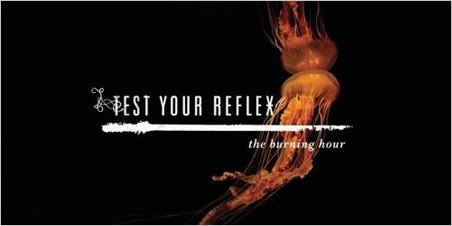
“Pieces of the Sun”
from the album The Burning Hour
2007
iTunes
MP3 – “Pieces of the Sun”
When bands hail from Southern California, they often take one of two routes: sensitive, anthemic alternative rockers a la Incubus or Blink-182-style never-grow-up punks.
Test Your Reflex splits the difference.
The group’s debut album The Burning Hour, due out in stores April 24, is a ’80s-tinged collection that’s dance-pop with a sweepingly melodic heart.
Displaying a diversity of tunes that sound like everything from not-as-moody Depeche Mode (“Pieces of the Sun”) to dance-floor stompers (“Black Hearts”), Test Your Reflex is bucking the trend of one-note rockers. The album is like the soundtrack to a really good 1980s movie: fun, stylish, emotive.
“We spent two years writing the album,” said lead singer/multi-instrumentalist Ryan Levine. “The goal was to make a record that was good from start to finish. We wanted something that didn’t seem to have filler tracks.”
Reached by phone last week after a gig in Albany, N.Y., Levine was prepping for the launch of Test Your Reflex’s first big tour, which started in Toronto on March 23 and ends May 12 in Detroit.
It’s a big change from Test Your Reflex’s less-than-auspicious beginning: playing regular gigs for years at the Thousand Oaks Teen Center in California. The band’s classically trained keyboardist Andrew Ampaya has called the center the band’s own “CBGBs — but without the booze and the vibe.”
“It was the only place in town where bands could rehearse other than their parents’ garage,” Levine said.
Levine had been playing at the teen center with various bands since he was 10. It is a typical suburban teen gathering place with a pool, Ping-Pong table and a basketball court that doubled as a performance stage. Test Your Reflex had their first show there four years ago, after Levine teamed up with drummer Sal Cortez (whom he met through an ex-girlfriend), bass player Agustin Sanchez, lead guitarist R.C. and Ampaya, now all either 20 or 21.
After their start, it was very much a waiting game for Test Your Reflex, partly because they were all underage and therefore unable to play bar gigs. The Thousands Oaks Teen Center, in the meantime, proved to be their training ground and word quickly spread about their skills and hummable music. Around the same time, Levine spent months in his garage fiddling with arrangements and branching out musically.
“I had just got out of high school and I had been with this heavily electronic band,” said Levine, now 21. “I definitely wanted to maintain those electronic influences but make it more organic.”
The solution? Listening to electronic experimental work by David Bowie and Brian Eno, as well as stand-the-test-of-time landmark works by U2 and Peter Gabriel. When the group got together, Levine said, they were all into ’80s new wave bands, like the Cure and Duran Duran. Soon much of the music took a new direction.
“The song ‘I am Alive’ I think was a turning point, a step in a different direction,” Levine said. “We definitely had this first wave of influences and then this whole different set of influences.”
Such disparity seems like fuel for a disjointed album. That somehow isn’t the case on the polished The Burning Hour, which switches back and forth between the emotional and the danceable. The first single, “Pieces of the Sun,” was the first song that came out of the new set of influences, a sonically pleasing mature anthem. But other parts of the album are pure synth-fueled pop.
Levine said the band was aware of people’s tendencies to categorize a band based on their first single or the overall tone of the first album.
“That’s going to happen regardless of what you try to do,” he said. “With a baby band like us, if you use any kind of synthesizer, you’re going to be immediately compared to the Killers or the Bravery or that whole crowd. It doesn’t really bother us.”
In the past two years while writing The Burning Hour, the band bust out of the teen center and into the jaded Hollywood bar scene, soon after Cortez turned 18. It was a judgmental audience, Levine said, and the band expected as much. But since most of their gigs were in Los Angeles, Test Your Reflex carried with them an ever-ready cadre of supportive friends to the shows. Major labels took notice of the established following and their unique sound and RCA signed the group last year.
Despite their somewhat stop-and-go start, Levine said Test Your Reflex does think about the future. They want to model their career on the likes of U2, a band whose sound and staying power they admire. It’s a tall order, but one that Levine feels is possible.
In the meantime, “The Burning Hour,” their two-years-in-the-making baby, is top priority. It’s not a surprise that Levine picked the first song on the album “I’m Not Sorry,” something experimental and different and lush, as the one that captures what Test Your Reflex wants to say about who they are.
“It captures the perspective of the band more than anything musically and lyrically,” Levine said. “That’s what we all are very proud of.”


